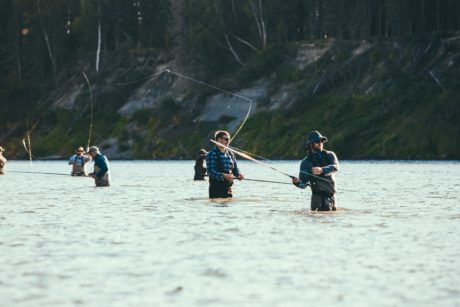
Every year in Alaska, we repeatedly see a common mistake anglers of all types make. They all wade too deep. Whether they fill the fish on the opposite side of the river or in the middle of the river, many anglers feel if they get deep into the river, they will get closer to the fish. It’s quite the opposite. The “closer” you try to get to the fish, the further away you push them. Counterintuitive? Yes.
Every play with magnets? There are two sides, a positively charged side, and a negatively charged side. What happens when you place two of the same sides near each other? They repel each other like you and your ex-significant other, correct? That is what you do to fish when you roll in too deep. Think of yourself as a powerful magnet, and all you want to do is get closer to the fish, which is another powerful magnet, so try to get closer and closer by wading deeper and deeper. But like the two positively charged end magnets facing each other, you push the fish away and further into the river.
We all have this innate desire to cast far to get to the deep seam out in the river, so we try to get as close as possible. The “if your butt ain’t in the water (literally), you ain’t fishing” mentality is ingrained in many of us. Like many other animals, we forget that fish prefer the path of least resistance, which is usually closer to the banks. When you wade, you push running fish further into the deep. This is particularly impactful when multiple species are in the river at one time. Sockeye like to swim on the edges of the rivers, with Chum, just inside of them and Kings, inside the Chum. By wading too deep, you effectively push salmon away from you. You may still hook fish, but the further out you are, the more difficult it becomes to land a fish, and the chances of your fish of a lifetime unbuttoning are much higher.
Ultimately, we want to make it easy for ourselves, and by keeping fish in shallower water, we have a better chance of landing a fish. So, when approaching the water, start shallow, and only roll the deep if you absolutely have to.
Other Fishing Tips:
Leave a Reply